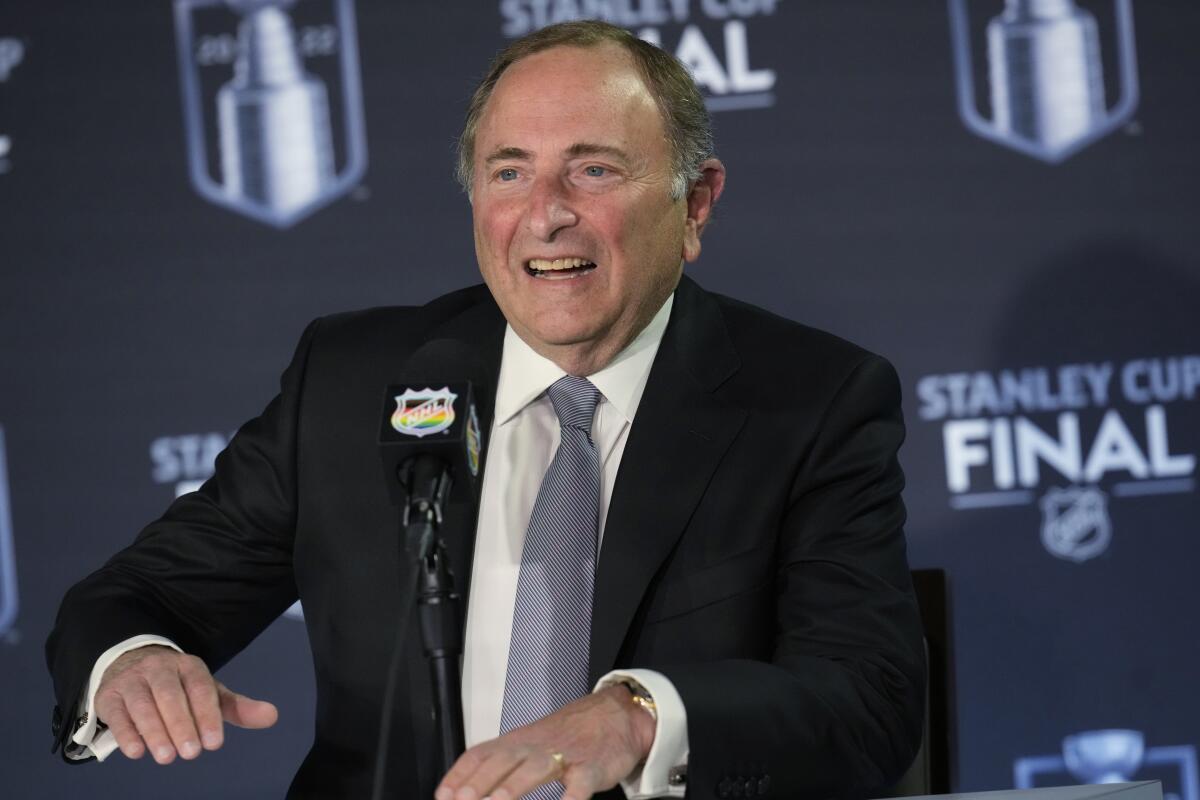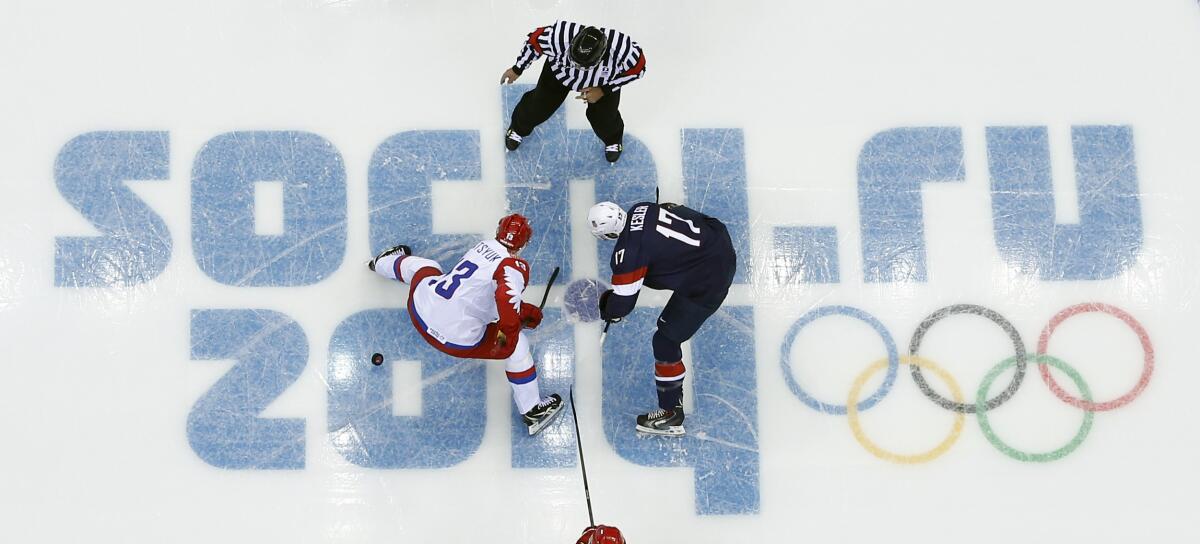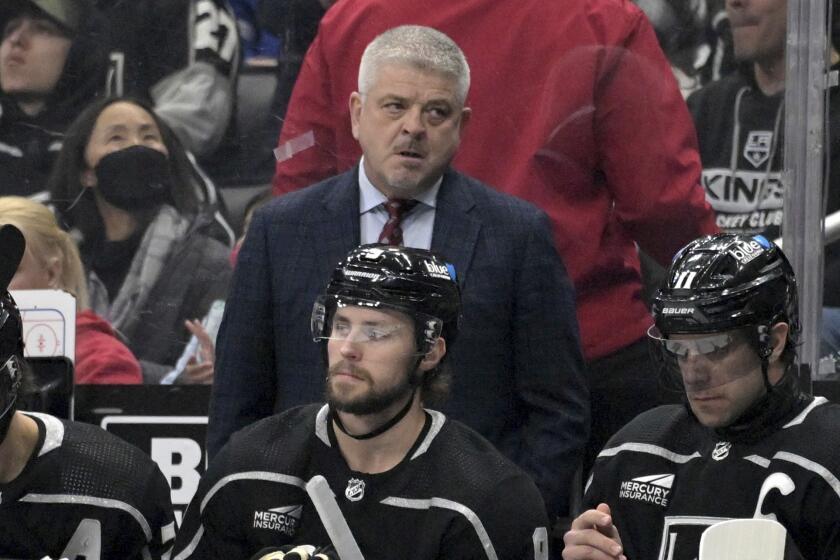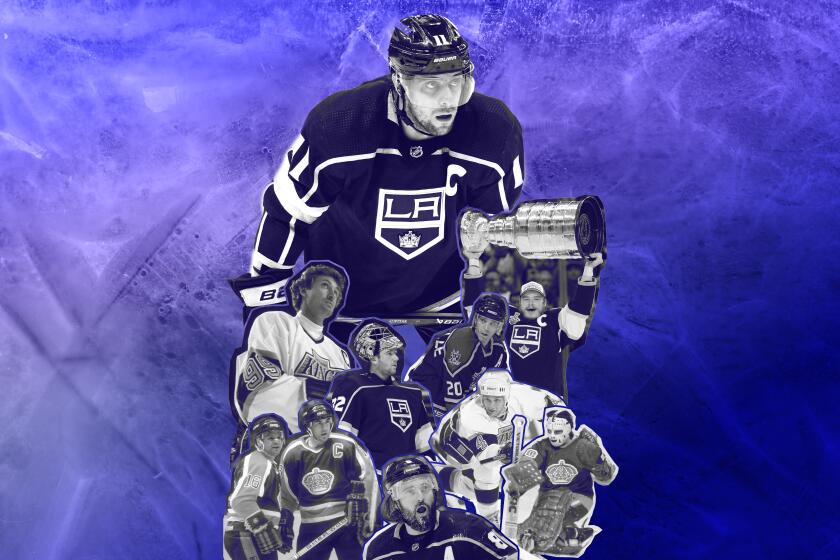The real reasons why Gary Bettman is letting NHL players back in the Olympics

- Share via
The return of NHL players to the Olympics at the 2026 Milan-Cortina Winter Games makes so much sense, it’s almost difficult to believe commissioner Gary Bettman agreed to let players represent their respective homelands in Italy and at a still-to-be-determined site in 2030 after holding them out of the two previous Olympic tournaments.
Persuading team owners that it would be worthwhile to pause the season for the Olympics was no small feat. Bettman, who this week celebrated his 32nd anniversary in office, still has that power. And this time he could guarantee they wouldn’t have to pay the hefty costs of players’ insurance or for housing them and their families at the Games, thanks to the International Ice Hockey Federation’s decision to take on that responsibility.
He framed it as a gift to players. But, as always, follow the money for the real motivation.
The Kings parted ways with coach Todd McLellan on Friday, but there are still significant problems with the roster as the team tries to right itself.
“There is a recognition of how important this is to the players. And in the spirit of cooperation, particularly the work that we did together during COVID, everybody felt on our side that it was the right thing to do,” Bettman said Friday at a news conference in Toronto during the NHL’s All-Star weekend.
“This really came down to doing something because the players really wanted it,” he said as he sat beside Marty Walsh, executive director of the NHL Players’ Assn., and Luc Tardif, president of the International Ice Hockey Federation.
This will be the sixth tournament involving NHL players. The first was in Nagano, Japan, in 1998, followed by Salt Lake City in 2002; Turin, Italy, in 2006; Vancouver in 2010, and Sochi, Russia in 2014. The tournament will be played on NHL-sized rinks, as they were in 2010 and 2014.

The time difference between Italy and North America is more suitable for scheduling prime-time TV events in the U.S. than were the vast time differences between North America and South Korea in 2018 and between North America and China in 2022. Also crucial to Bettman’s decision is the league will have greater ability to promote its players than it had been given before.
At previous Olympics, the NHL wasn’t allowed to market players and use video of them competing at the Games, a big source of frustration for Bettman that left him butting heads with the autocrats of the International Olympic Committee, some of the few people in the world who are more stubborn than he is. He leveraged that obstacle, the long travel, and the disruption of the league’s regular-season schedule to contend it did the NHL no good to allow players to compete at the Olympics.
The IOC’s softening of its stance made the 2026 Olympics an opportunity too good for Bettman to pass up.
“The discussions are constructive and positive enough that we think we’ll have enough content access, better than we’ve had in the past,” he said. “That’s one of those things that we’ll work our way through.

“But in order for us to be able to participate in 2026 we couldn’t dot every ‘i’ and cross every ‘t’ but on the big items that were essential, we were able to do that. And the other things, we’ll work out.”
Increasing its international exposure is a crucial strategy for a league that always will lag behind the NFL, NBA and Major League Baseball domestically in popularity and revenues. The Olympics still draw huge global audiences.
But the IOC wanted to dictate all the terms and not dip into its obscene profits, freezing out the NHL. That arrogance took a hit when the quality of play at Pyeongchang in 2018 and Beijing in 2022 was far inferior to the tournaments that had included NHL players. It wasn’t best-on-best, as the Olympics are supposed to be. It wasn’t what fans deserved and it didn’t showcase the sport well.
Milan-Cortina should provide the NHL more exposure here and around the world. The 2030 Olympics site won’t be chosen until this summer, when the IOC meets during the Paris Summer Games, but it’s expected to be awarded to the area of the French Alps, with figure skating, speed skating, and hockey to be staged in Nice, in the south of France.
“That sounds nice,” Bettman said.
Um, yes.
Kings broadcasters Nick Nickson and Jim Fox along with Times columnist Helene Elliott rank the top 10 players in Los Angeles Kings history.
Amplifying the international theme, Bettman and Walsh announced the creation of the Four Nations Faceoff tournament, which will — hooray! — replace the outdated All-Star festivities next year.
In a hockey-tailored version of the NBA’s new in-season tournament, this event will involve teams of NHL players from the U.S., Canada, Sweden and Finland playing seven games from Feb. 12-20, 2025 in two North American cities, one in Canada and one in the U.S. Presumably, the winner will get to hang a banner as the Lakers did, for all the good that has done them.
“NHL players are the best players in the world who crave competition and an opportunity to measure their game against their peers,” Walsh said. “This marks a new era for international hockey,”
The Four Nations field skirts the politically hot issue of whether Russian players should be allowed to participate in international competitions by excluding them, in addition to excluding other significant hockey-playing nations such as Czechia, Slovakia, and Germany. Walsh and Bettman said time and logistics preclude inviting a bigger field, adding that other nations will have chances to participate in future events.
As planned, the Four Nations tournament will give fans a taste of international competition, to be followed by a buffet of the 2026 Olympics, a 2028 World Cup, the 2030 Olympics, and another World Cup in 2032.
“That’s the cycle we want to get on,” Bettman said. “This gets us started and puts us on a schedule that I think everybody is not just excited about but really comfortable with.”
Edmonton Oilers superstar Connor McDavid, in Toronto for All-Star weekend, said representing Canada in the Four Nations event will be “a dream come true.”
He added, “I feel like it’s important for hockey as we continue to try to grow our game internationally and at home. I think it’s a great thing, an exciting schedule, something that people can look forward to every two years, every second year.”
It makes sense. Bettman says he thinks it also will make dollars. It’s a win-win situation and essential for the NHL’s future.
More to Read
Go beyond the scoreboard
Get the latest on L.A.'s teams in the daily Sports Report newsletter.
You may occasionally receive promotional content from the Los Angeles Times.









